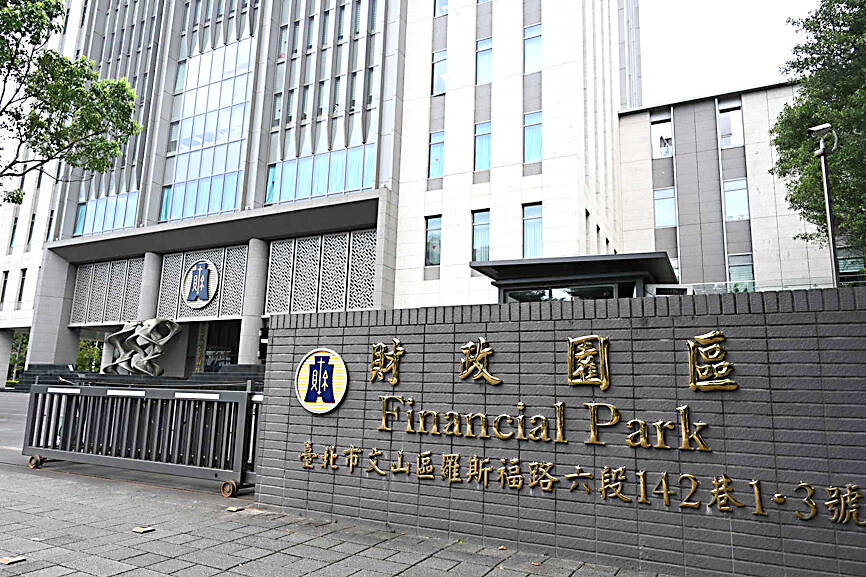Tax revenue last month tumbled 72 percent year-on-year to NT$194.1 billion (US$6.11 billion), dragged by the different deadline for filing corporate and personal income taxes last year, the Ministry of Finance said yesterday.
Corporate and personal income tax revenue stood at NT$8 billion and NT$7.8 billion, diving 97.4 percent and 96.4 percent respectively from the levels last year when the government granted a one-month moratorium for income tax declaration to accommodate inconveniences caused by the COVID-19 pandemic, ministry statistics official Liang Kuan-shuan (梁冠璇) told an online news briefing.
“There is no need to worry about the retreats attributable to deadline adjustments,” Liang said.

Photo: Chang Chia-ming, Taipei Times
Tax revenue in the first seven months gained 9.2 percent to a record high of NT$2.29 trillion and ahead of the budget schedule by 15.6 percent, thanks to marked increases in revenue of corporate and personal income, business, stamp, tariff, house and car license taxes, she said.
The uptrend would likely be sustained as the nation’s economy is about to emerge from a slowdown and help energize business activity, Liang said, adding that the state coffers would also receive a boost from higher property and house taxes.
Securities transaction tax revenue, the main drag last year due to a bear market, spiked 57.1 percent to NT$22.3 billion, as the local bourse benefited from the global artificial intelligence boom.
Prices of local shares involved in supply of artificial intelligence hardware devices have more than doubled in recent months, Taiwan Stock Exchange data showed.
Daily stock turnover soared 69.3 percent year-on-year to NT$459.2 billion last month and has hovered at about similar levels so far this month, Liang said, adding that securities transaction tax revenue would beat the budget target by a big margin if that momentum sustains for the rest of this year.
Land value incremental tax revenue, a major gauge of property transactions, amounted to NT$6.9 billion, rising 7.6 percent from a year earlier, the ministry said.
Liang refrained from interpreting the increase as a recovery in the property market, saying longer observation would be necessary as the government has introduced a series of measures to curb property price hikes.

Shares in Taiwan closed at a new high yesterday, the first trading day of the new year, as contract chipmaker Taiwan Semiconductor Manufacturing Co (TSMC, 台積電) continued to break records amid an artificial intelligence (AI) boom, dealers said. The TAIEX closed up 386.21 points, or 1.33 percent, at 29,349.81, with turnover totaling NT$648.844 billion (US$20.65 billion). “Judging from a stronger Taiwan dollar against the US dollar, I think foreign institutional investors returned from the holidays and brought funds into the local market,” Concord Securities Co (康和證券) analyst Kerry Huang (黃志祺) said. “Foreign investors just rebuilt their positions with TSMC as their top target,

REVENUE PERFORMANCE: Cloud and network products, and electronic components saw strong increases, while smart consumer electronics and computing products fell Hon Hai Precision Industry Co (鴻海精密) yesterday posted 26.51 percent quarterly growth in revenue for last quarter to NT$2.6 trillion (US$82.44 billion), the strongest on record for the period and above expectations, but the company forecast a slight revenue dip this quarter due to seasonal factors. On an annual basis, revenue last quarter grew 22.07 percent, the company said. Analysts on average estimated about NT$2.4 trillion increase. Hon Hai, which assembles servers for Nvidia Corp and iPhones for Apple Inc, is expanding its capacity in the US, adding artificial intelligence (AI) server production in Wisconsin and Texas, where it operates established campuses. This

H200 CHIPS: A source said that Nvidia has asked the Taiwanese company to begin production of additional chips and work is expected to start in the second quarter Nvidia Corp is scrambling to meet demand for its H200 artificial intelligence (AI) chips from Chinese technology companies and has approached contract manufacturer Taiwan Semiconductor Manufacturing Co (TSMC, 台積電) to ramp up production, sources said. Chinese technology companies have placed orders for more than 2 million H200 chips for this year, while Nvidia holds just 700,000 units in stock, two of the people said. The exact additional volume Nvidia intends to order from TSMC remains unclear, they said. A third source said that Nvidia has asked TSMC to begin production of the additional chips and work is expected to start in the second

US President Donald Trump on Friday blocked US photonics firm HieFo Corp’s US$3 million acquisition of assets in New Jersey-based aerospace and defense specialist Emcore Corp, citing national security and China-related concerns. In an order released by the White House, Trump said HieFo was “controlled by a citizen of the People’s Republic of China” and that its 2024 acquisition of Emcore’s businesses led the US president to believe that it might “take action that threatens to impair the national security of the United States.” The order did not name the person or detail Trump’s concerns. “The Transaction is hereby prohibited,”